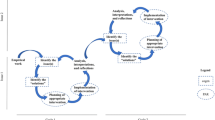Abstract
In this paper, in response to Ajay Sharma’s paper titled “Portrait of a science teacher as a bricoleur: A case study from India” and associated reviews, I address the value of bridging two narrative styles for describing teacher development, discuss questions of over-essentializing an Indian school context, propose that teacher and student participants should be included in this type of writing series, and identify institutional barriers to researchers acting as agents-of-change.

Similar content being viewed by others
References
Bennett, L., Collins, J., & Emdin, C. (2007). A metalogue on urban schools and science classrooms: Student voices on research products. Cultural Studies of Science Education, 2, 387–392.
Calabrese Barton, A., & Darkside (2000). Autobiography in science education: Greater objectivity through local knowledge. Research in Science Education, 30, 23–42.
Carlsen, W.S. (1993). Teacher knowledge and discourse control: Quantitative evidence from novice biology teachers’classrooms. Journal of Research in Science Teaching, 30, 471–481.
Carr, W. (2006). Philosophy, methodology and action research. Journal of Philosophy of Education, 40, 421–435.
Delgado-Gaitan, C. (1993). Researching change and changing the researcher. Harvard Educational Review, 63, 389–411.
Guba, E., & Lincoln, Y. (1989). Fourth generation evaluation. Newbury Park, CA: Sage Publications, Inc.
Holland, D. (1998). Identity and agency in cultural worlds. Cambridge: Harvard University Press.
Moll, L., Amanti, C., Neff, D., & Gonzalez, N. (1992). Funds of knowledge for teaching: A qualitative approach to developing strategic connections between homes and classrooms. Theory into Practice, 31, 132–141.
Nasir, N., & Hand, V. (2006). Exploring sociocultural perspectives on race, culture and learning. Review of Educational Research, 76, 449–476.
Tobin, K. (in press). Repetition, difference and rising up with research in education. In K. Ercikan & W.-M. Roth (Eds.), Generalizing from educational research. Mahwah: Lawrence Erlbaum and Associates.
Turner, E., & Font, B. (2003). Fostering critical mathematical agency: Urban middle school students engage in mathematics to understand, critique and act upon their world. Paper presented at the American Education Studies Association Conference, Mexico City.
van Driel, J.H., Verloop, N., & de Vos, W. (1998). Developing science teachers’ pedagogical content knowledge. Journal of Research in Science Teaching, 35, 673–695.
Author information
Authors and Affiliations
Corresponding author
Rights and permissions
About this article
Cite this article
Basu, S.J. Empowering communities of research and practice by conducting research for change and including participant voice in reflection on research. Cult Stud of Sci Educ 3, 859–865 (2008). https://doi.org/10.1007/s11422-008-9119-8
Received:
Accepted:
Published:
Issue Date:
DOI: https://doi.org/10.1007/s11422-008-9119-8




